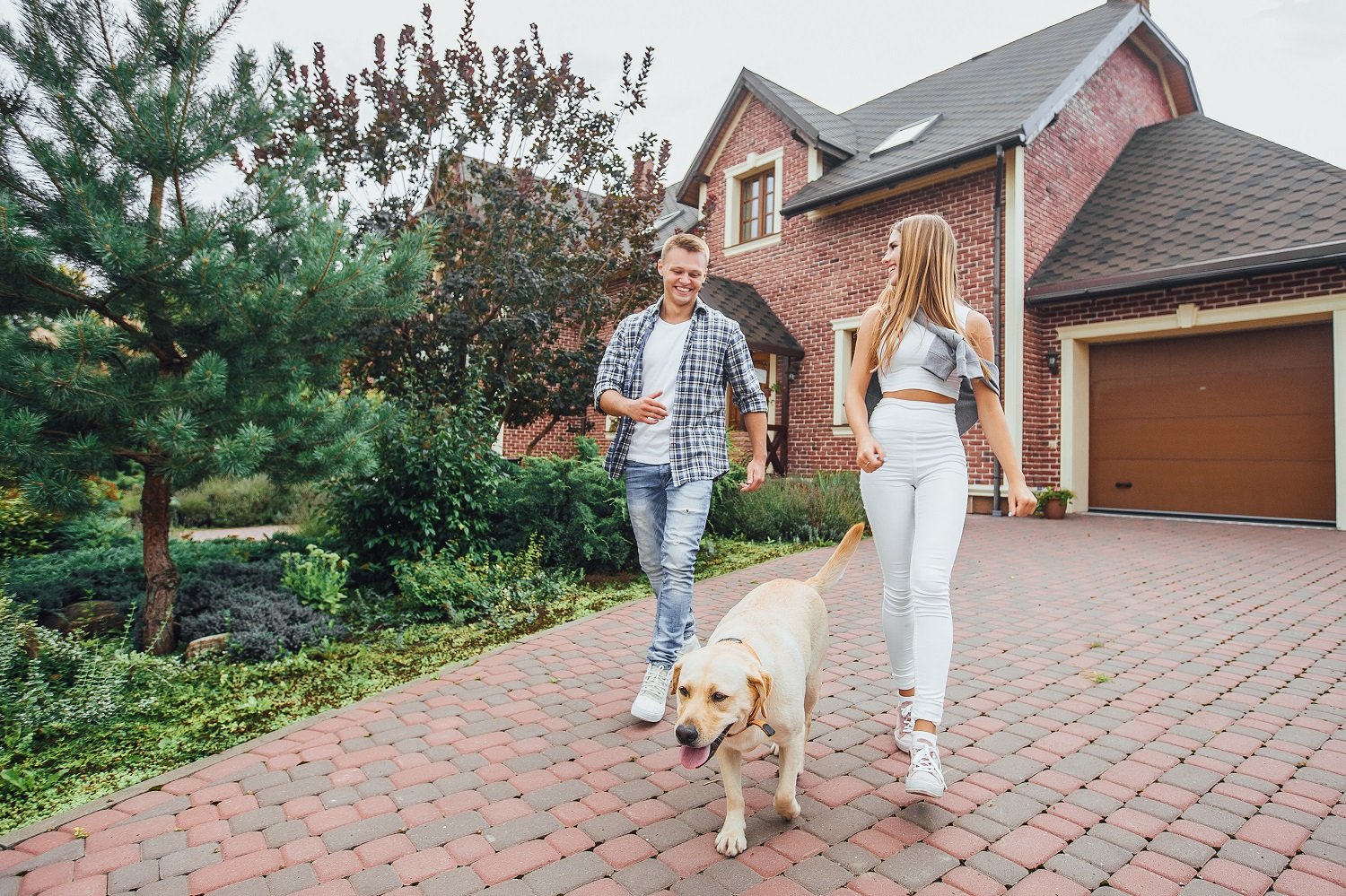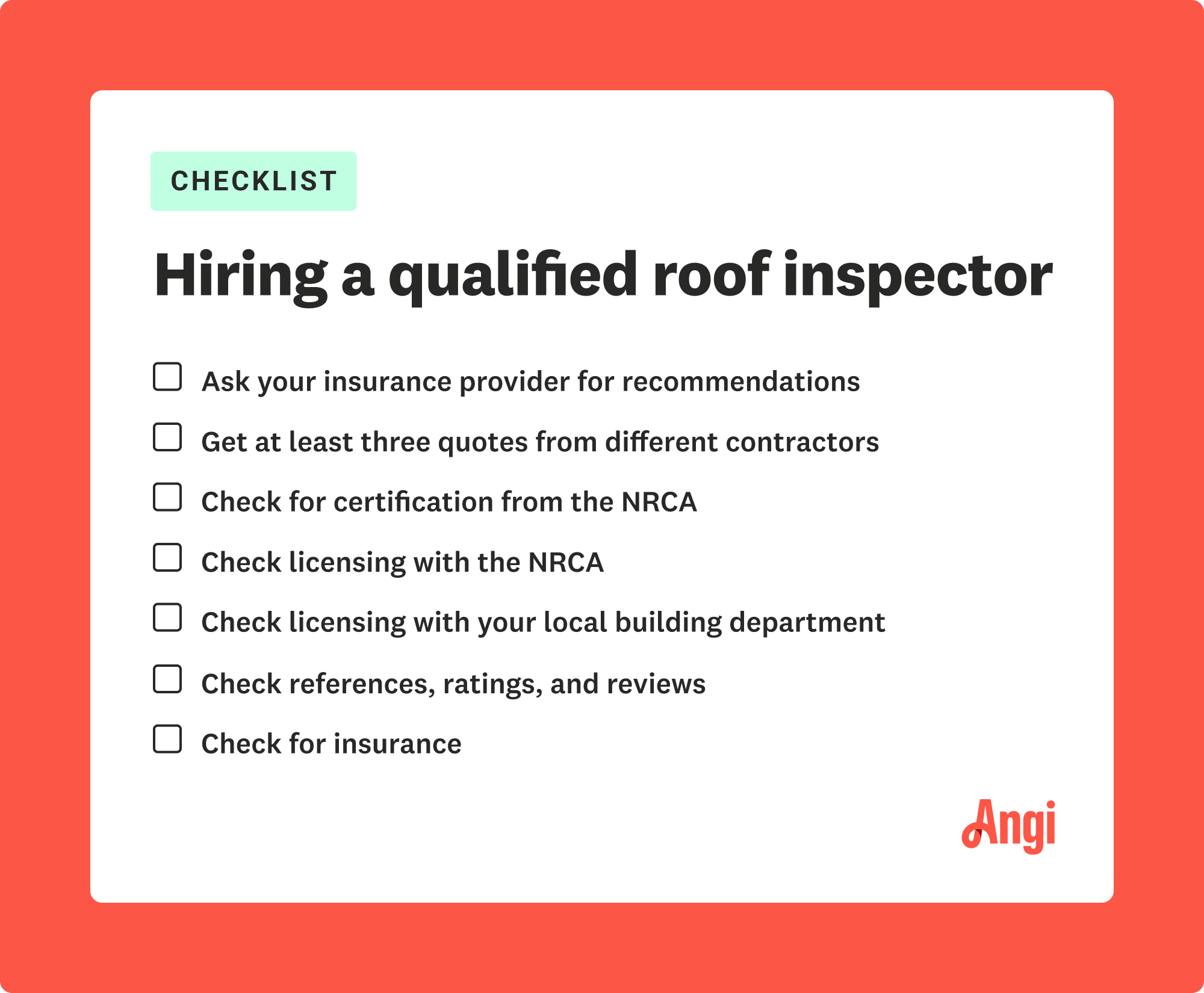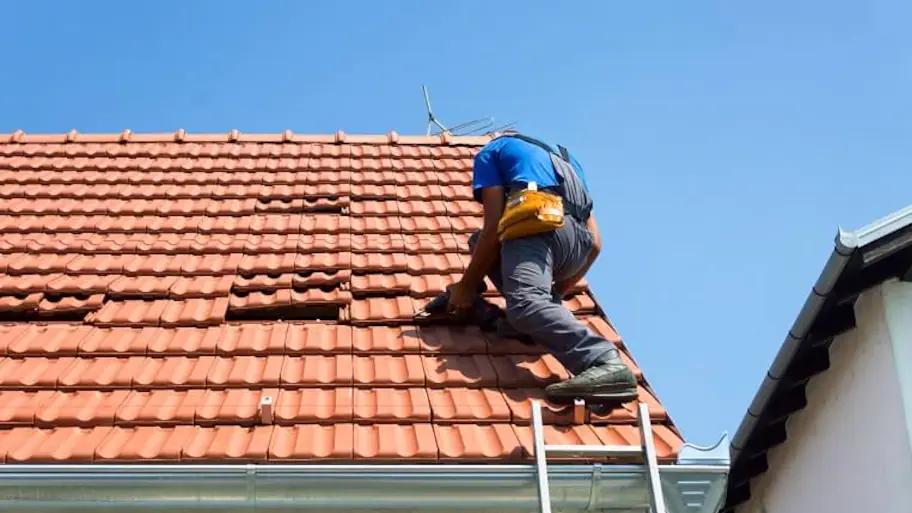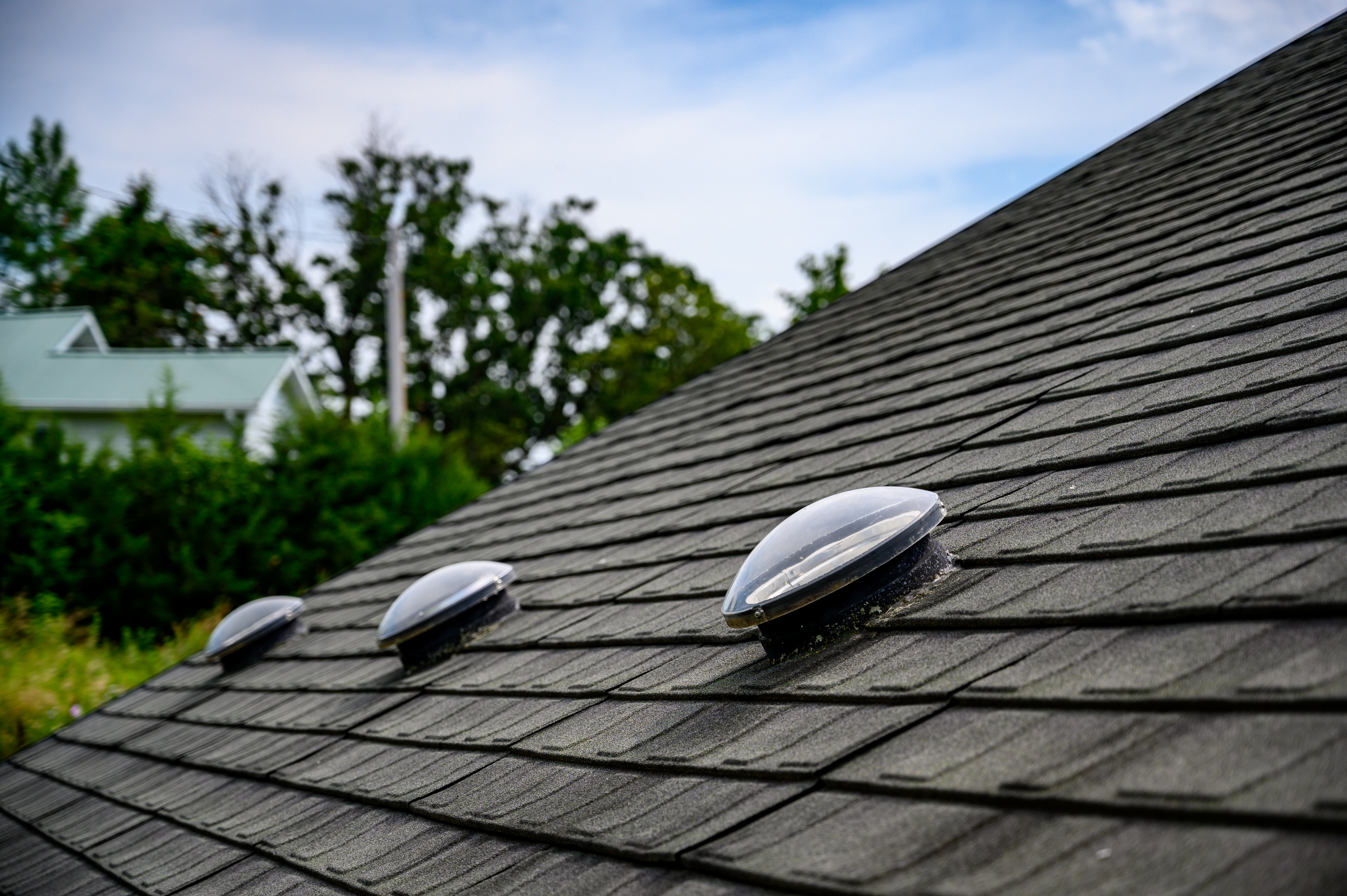
Knowing your home's roof underlayment replacement cost can help estimate the cost of roof replacement. Learn about the factors that affect prices.
The average cost to hire a roof inspector is $247, but it often costs between $125 and $376 depending on your roof.


A basic roof inspection for a 1,700 sq. ft. roof costs $125 to $357 but could be included with your repair.
Inaccessible or unstable roofs require more time and expertise, or possibly even a drone, which will increase your costs.
Infrared inspections, which check for moisture, are at least double the cost of basic inspections.
If your inspection is part of the process of buying or selling a home, budget another $200 for a roof certificate.
A healthy roof is one of the secrets to battling leaks, mold, ventilation issues, and even high energy bills. Whether you're in escrow for a new home, recently weathered a rough storm, or simply want to confirm your roof is ready for the winter ahead, hiring a professional roofing expert is the way to go. The national average cost of a roof inspection is $247, although it can cost between $75 and $1,000, depending on the type of inspection and your roof's size and pitch. Some roofing contractors will offer very basic inspections for free before performing work.
The total cost of your roof assessment will depend on the size and style of your roof, the overall accessibility, and the extent of your roof’s damage. The more time it takes to access and inspect your roof, the more you can expect to pay.
A physical inspection is the least expensive type of inspection—it’s also the most basic. Some homeowners require a more in-depth inspection or have an inaccessible roof. In this case, you could pay anywhere from twice to six times as much for a drone or infrared inspection.
While most local roof inspectors charge a flat fee, some will charge you by the square footage of your roof. Expect an added surcharge if you have a larger-than-standard roof. Standard roof inspections cost between $125 and $358.
Here’s a breakdown of roof inspection costs by square foot:
| Roof Size (Square Feet) | Average Cost |
|---|---|
| 1,000 | $75–$210 |
| 1,700 | $125–$357 |
| 2,000 | $150–$420 |
| 3,000 | $225–$630 |
| 3,500 | $265–$735 |
A severely damaged roof may take longer to inspect. Some inspectors may charge an additional fee for inspections that take more than a certain amount of time.
Different types of roofing materials require different types of experts to properly inspect for damage. For example, you’ll pay more to have a slate roof inspected than to have standard asphalt shingles inspected.
Roofs that are very high or steep are more difficult for inspectors to access, which can increase the cost of inspection. Special equipment such as high-zoom binoculars may be required, or you may have to upgrade to a more expensive option, such as a drone inspection or infrared assessment.

We all know that prices run the gamut across the country for everything from groceries to real estate. Standard home services like roof inspections act the same way. You'll find different price ranges in your region depending on the cost of living, the common sizes of homes in your area, and if your town has a large number of historic buildings with complex roofs.
Let's look at roof inspection costs for a few popular regions:
| Region | Cost |
|---|---|
| Eastern Seaboard | $170–$370 |
| Southeast | $190–$200 |
| Southwest | $130–$160 |
| West Coast | $250–$1,200 |
| Pacific Northwest | $220–$420 |
A few factors can influence how often you should have your roof inspected, including the age of your home's roof and the climate conditions in your location.
If your property contains mature trees that overhang the home's roof, twice-a-year DIY visual inspections are essential to catch problems early. Keeping the roof clear of tree debris is essential for your roof's health at all times. Having an annual professional inspection will offer deeper insight into the ongoing health of your roof.
Annual professional inspections are necessary for homes in locations that experience frequent high winds or heavy precipitation. Homeowners in more mild climates can get away with having a professional inspection about once every two years.
There are three main types of roof inspections. A physical inspection is traditional, but you may need a different type of inspection if your roof is inaccessible or has a steep pitch.
Here are estimated costs for the different types of roof inspections:
| Type of Inspection | Cost |
|---|---|
| Physical | $75–$200 |
| Drone | $150–$400 |
| Infrared | $400–$600 |
Relatively flat and easily accessible roofs will receive a traditional physical inspection. These will cost between $75 and $200 on average. Check with your insurance to see if it covers the cost of this inspection. During the visit, the inspector will inspect the roof, interior, and related structural elements for signs of:
Structural decay
Water damage
Moss, mold, or algae
Worn building materials
Interior leaks
Pests
Holes or storm damage
“These basic inspections usually consist of checking your roof for any holes or areas of visible damage,” says Eric Gonzalez, Angi Expert Review Board member and president of Regions Commercial Roofing, with locations in five states. “Other things contractors check for are hail damage, wind damage, or if a manufacturer’s defect exists.”
If your roof is too steep or possibly unstable to walk on, an inspector may use a drone to help. This type of inspection allows everyone to stay safe on the ground as the flying robot checks the exterior for damage while taking pictures for you, your contractor, or your insurance company. These inspections will run from $150 to $400. Your insurance could potentially cover this type of inspection.
Some roof issues are nearly impossible to detect until they've caused significant damage. But infrared technology can speed up the process, catching leaks and cracks long before they become a more critical issue for your home. Due to their complexity, expect to pay between $400 and $600.
A qualified UAV pilot will send a drone over your roof equipped with infrared technology. The photos will capture areas with unbalanced levels of heat and moisture, all of which can be a sign of saturated insulation, cracks, or breaks in the seal of your roof. Sometimes contractors use third parties to perform these inspections, so the cost is a little higher.
Some roof contractors will offer “free” inspections during the roofing estimate process before writing up a quote for the work. Depending on the service, this may not be as extensive of an inspection or meet the requirements of your lending or insurance company.
You may want to splurge on some other services beyond a roof inspection. It’s especially important to make recommended repairs to preserve the life span of your roof. Here are some common additional expenses.
An attic inspection costs between $200 and $500 on average. This can help catch issues that aren’t visible on the surface of the roof—such as wood rot, water damage, mold, holes, and poor ventilation. Sometimes attics are included in a roof inspection, so check with your inspector.
A typical roof certification costs between $75 and $200. This document, which is issued after an inspection, details the condition of your roofing materials and estimates when you’ll likely need to replace your roof. Homeowners choose to get roof certifications because:
They give confidence to potential buyers
They’re a requirement for certain mortgage lenders
They provide peace of mind

If your roof inspection identifies problems, you may want—or need—to make repairs. For the typical homeowner, roof repairs cost between $400 and $1,800, though they could cost more than $7,000 if there are serious structural issues.
Sometimes repairs aren’t possible or economical. In this case, a roof replacement costs an average of $9,000. You may spend more depending on the size and pitch of your roof.
For your own safety, you should never attempt to perform a roof inspection yourself, especially if you are unsure of the stability of your roof. Additionally, many banks and insurance companies will not accept a self-inspection to move forward on a project.
However, you can and should perform simple inspections of your roof from the ground. Look for loose shingles, stray branches, or damaged eaves, particularly after a storm.
You can also regularly perform a thorough search for issues inside your home, particularly in the attic and where the eaves meet the edges of your walls.
For the typical homeowner, there’s not a huge range of roof inspection prices. Nonetheless, there are a few ways you can save a little cash—especially if you know your roof requires a repair.
If you know you need roof repairs, you can save on the cost of inspection by bundling these jobs together. Most contractors perform a free (or very low-cost) roof inspection before making repairs so they can diagnose the issue and give you a proper quote.
Make sure you keep up with regular inspections, especially as your roof ages. You’ll save money in the long run by fixing small issues before they spiral into bigger problems. Most homeowners should inspect their roofs annually and after major storms.
Most roofing warranties require an annual inspection. Even so, you can save money in the long run by making repairs while your roof is still under warranty. Keep in mind that metal roofing, in particular, has notoriously short manufacturer warranties, and many insurance companies won’t pay for a roof replacement. To avoid high metal roof costs, catch issues before they spiral into a full-on replacement.
Home is the most important place on earth, which is why Angi has helped more than 150 million homeowners transform their houses into homes they adore. To help homeowners with their next project, Angi provides readers with the most accurate cost data and upholds strict editorial standards. We’ve surveyed thousands of real Angi customers about their project costs to develop the pricing data you see, so you can make the best decisions for you and your home. We pair this data with research from reputable sources, including the U.S. Bureau of Labor Statistics, academic journals, market studies, and interviews with industry experts—all to ensure our prices reflect real-world projects.
Want to help us improve our cost data? Send us a recent project quote to [email protected]. Quotes and personal information will not be shared publicly.
From average costs to expert advice, get all the answers you need to get your job done.

Knowing your home's roof underlayment replacement cost can help estimate the cost of roof replacement. Learn about the factors that affect prices.

The average cost of roof repair for U.S. homeowners averages between $386 and $1,875. Learn what factors can affect roof repair costs.

Discover the most significant factors regarding aluminum roofing cost to help you make informed decisions about your investment in one for your home.

EPDM roofing is an affordable, long-lasting roofing option for flat or low-sloped roofs. Learn what it is, the pros and cons, the cost, and when to use it.

Metal roofing pros and cons include a long lifespan and a high cost, respectively. Keep reading to discover if metal roofing is right for your home.

Looking to welcome more natural light into your home? Weigh these pros and cons of solar tube lighting to see if it’s right for your project.